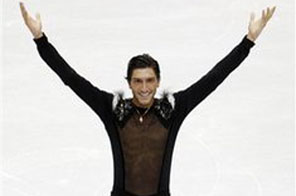Skaters Lysacek, Kim discover obligations, spoils
LAKE PLACID: Evan Lysacek and Kim Yu-na have discovered that the spoils of being a world champion are matched by the obligations. They're learning that their own high expectations might not measure up to those placed upon them by outsiders.
And if they're not careful, that can lead to impatience, stress, even mediocrity.
"I feel a little bit of pressure," says Kim, the 19-year-old South Korean who has revitalized women's skating with several surpassing performances this year. "My first competition (this season) was even better than the world championships and everyone expects me to do a clean competition. But I try to concentrate on me and my skating."
And when the skating isn't quite up to her unprecedented levels, as happened when she won Skate America earlier this month?
"Not every skater can achieve what they want every time," Kim says. "I was feeling the expectations from many people and was under pressure from that."
Her coach, Brian Orser, noticed it. Orser knows all about the duress top-level athletes operate under. He won the world crown in 1987, making him the favorite for the 1988 Olympics in Calgary. As a Canadian, he was energized by the home-ice advantage, if you will.
He also was stressed out by all the predictions he would become the first man from his nation to win Olympic gold in the sport.
He lost, barely, to American Brian Boitano.
"She recognizes the demands," says Orser, who trains Kim in Toronto. "You can't be sheltered from them or from all the expectations and that, because it's only going to be stronger and more of it in Vancouver.
"She takes comfort in knowing I have been through it before. I told her, 'There's nothing you are going through that I didn't go through.' She takes comfort in that. When I told her that and she understood, I could see her relax."
When Kim is relaxed on the ice, she blows away the competition and rewrites the records. Lysacek isn't quite so far in front of the men's field, but he — and Kim — also are recognizing that the world titles each won for the first time in March in Los Angeles can carry them to new heights of achievement. They get a belief that nothing is beyond their reach — particularly when they reach Vancouver.
"I was worried if I would feel all that pressure to be a world champion," Kim admits, "but it was a good chance to get more confidence for me and to make me think (more highly) of myself and my skating."
Ditto, Lysacek says with a wide grin.
"I'm very confident in my own skin and confident in my skating," the two-time U.S. champion says as he comes off a strong Grand Prix series and heads to the Grand Prix final in Tokyo next month as a gold medal favorite. "To win that world title gave me justification for the last 15 years, for everything I have put in, all the hard work and hours of training and dedication.
"As athletes, a lot of us feel maybe we will not get there, get to our goals, and we might have to be satisfied with something less. But to get there, to get what I worked for, it makes you very content."
Content? Which can lead to lethargy or overconfidence?
"Content in what you achieved," Lysacek says, "but then I went back to work and worked even harder than ever. I feel I'm a better athlete mentally and physically than last year. The world championship sort of rejuvenated me."
Unlike Kim, whose first senior worlds was only two years ago and, seemingly, shouldn't need any rejuvenation at her age, Lysacek has been around though much of this decade. His first nationals as a senior were in 2001, when he finished 12th.
Lysacek chased Evgeni Plushenko, Stephane Lambiel, Jeffrey Buttle and Brian Joubert, all of whom won worlds before he broke through in Los Angeles, his adopted hometown. In a sense, all but Buttle, who's retired, will be chasing him at Vancouver.
"It gives you a sense that everything you think you are capable of doing is possible," he says. "You also realize you now really are an ambassador for the Olympics, the U.S., and for your sport. You need to make sure you have your priorities straight and don't get lost in all the stuff going on around (you).
"Yes, you want to represent your sport and your country well and you appreciate being able to talk about it. But you can't forget how you got there, the training that goes into it, setting a schedule that works best for your skating. That you're representing your sport and your country is magnified a little when you win the world title. The scrutiny of the world is on you."
Kim likely will feel that scrutiny more than any athlete in Vancouver, certainly more than any skater. She already has tremendous commercial appeal in South Korea, doing advertisements for everything from cars to mobile phones. The biggest crowds at Herb Brooks Arena for Skate America were for the women's programs, when hundreds of South Koreans filled the stands. Kim was surrounded by cameramen and reporters during all media interview opportunities, her every move chronicled as if, well, this were the Olympics.
It comes with the territory, of course.
"I'm sitting back and seeing how she's managed it and she understands the importance of it," Orser says. "The attention will always be there and you can't pretend it will not. So you try to embrace it like a champion."






